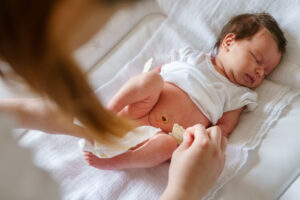Newborn Care Tips

Taking care of a newborn can be an exciting but challenging experience. Here are some important tips to help you care for your newborn baby:
-
- Feeding: Newborns need to be fed frequently, usually every 2-3 hours, as their tiny stomachs cannot hold much milk. If you are breastfeeding, try to feed on demand or every time your baby shows hunger cues like rooting or sucking on their hands. If you are formula-feeding, follow the instructions on the formula package for the appropriate amount and frequency of feeding.
- Diapering: Check and change your baby’s diaper frequently, about every 2-3 hours or whenever it’s wet or soiled. Keep the diaper area clean and dry to prevent diaper rash, as mentioned in the previous answer.
- Bathing: Until the umbilical cord stump falls off, give your baby a sponge bath or a gentle wipe-down with a damp cloth. Once the stump has healed, you can begin bathing your baby in a baby bathtub or basin with warm water (around 37°C or 98.6°F). Use mild, baby-specific soap and shampoo, and support your baby’s head and neck during the bath.
- Sleep: Newborns sleep a lot, typically around 16-17 hours a day in short periods. Establish a safe sleep environment by placing your baby on their back in a crib or bassinet with a firm mattress, fitted sheet, and no loose bedding or pillows. Ensure the room is at a comfortable temperature and avoid overdressing your baby.
- Bonding and Soothing: Spend time bonding with your baby through cuddling, talking, singing, and gentle touch. Newborns find comfort in being held, swaddled, or rocked. You can also use white noise machines or gentle music to help soothe them.
- Clothing: Dress your newborn in comfortable, soft clothing that is appropriate for the weather. Avoid overdressing or using clothes with rough seams or irritating tags that can cause discomfort.
- Hygiene: Newborns have delicate immune systems, so it’s crucial to maintain good hygiene. Wash your hands before handling your baby and ensure that visitors also practice proper hand hygiene. Keep your baby away from sick individuals and crowded places, especially during the early months.
- Health and Safety: Schedule regular check-ups with your pediatrician, who will monitor your baby’s growth and development and administer necessary vaccinations. Ensure your home is baby-proofed by securing cabinets, covering electrical outlets, and removing any small objects or choking hazards from the reach of your baby.

Remember, each baby is unique, and it’s important to trust your instincts and seek guidance from healthcare professionals or experienced caregivers when needed. Enjoy the precious moments with your newborn and take care of yourself too, as your well-being is essential for providing the best care for your baby.
